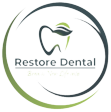
Gum Diseases
Gum disease describes swelling, soreness or infection of the tissues supporting the teeth. There are two main forms of gum disease:
1. Gingiviti
2. Periodontitis
WHAT IS GINGIVITIS?
Gingivitis means inflammation of the gums. This is when the gums around the teeth become very red and swollen. Often the swollen gums bleeds when they are brushed during cleaning.
WHAT IS PERIODONTITIS?
Long standing gingivitis leads to periodontitis / periodontal disease. There are various types of periodontal disease, and they affect the supporting tissues of the teeth. As the disease gets worse, the bone anchoring the teeth in the jaw is lost slowly, leading to loosening of the teeth.
If this condition is not corrected at the right time, the teeth may eventually fall away.
WHO ARE LIKELY TO SUFFER FROM A GUM DISEASE?
Probably. Most people suffer from some form of gum disease, and it is the major cause of tooth loss in adults. However, the disease develops very slowly in most people, and it can be slowed down to a rate that should allow you to keep most of your teeth for life.
WHAT ARE THE CAUSES OF GUM DISEASES?
All gum problems are caused due to soft and hard deposit accumulation, which due to some reason is not noticed at the right time and not cleaned professionally by a dentist.
PLAQUE- A film of bacteria, which forms on the surface of the teeth and gums every day. Many of the bacteria from the plaque are harmless and do not create any problems, however some of the bacteria they do cause gum diseases like gingivitis further leading to periodontitis.
To prevent and treat the underlying cause, one should go in for a regular dental check-up followed by regular scaling done by dentist to avoid the disease progression.
Also the dentist will instruct you regarding the brushing techniques as well as flossing methods which aid in further removal of plaque deposition.
WHAT HAPPENS IF GUM DISEASE IS NOT TREATED?
Unfortunately, gum disease progresses painlessly on the whole so that you may not notice the damage it is doing. However, the bacteria are sometimes more active and this makes your gums sore. This can lead to gum abscesses, and pus may ooze from or around the teeth. Over a number of years, the bone supporting the teeth can be lost. If the disease is left untreated for a long time treatment can become more difficult.
HOW DO I KNOW IF I HAVE GUM DISEASE?
The first sign may be bleeding during brushing on the toothbrush or in the rinsing water when you clean the teeth. Your gums may also bleed during eating, leaving a bad taste in your mouth. Your breath may also become unpleasant.
WHAT SHOULD BE DONE IF THESE SYMPTOMS ARE NOTICED?
The first thing to do is to visit a dentist for a check-up of your teeth and gums. During a dental checkup a thorough examination of the gums, teeth and the supporting hard and soft tissues will be done. If necessary a full mouth x-ray or an extra-oral x-ray will be suggested to rule out the spread and extent of the disease and a proper treatment plan will be worked out according to the underlying condition different for every individual.
TREATMENT OPTIONS:
According to the clinical and radiographic examination a proper treatment plan will be made, generally it starts with cleaning of the local factors i.e the plaque and calculus to remove the causative factors.
Scaling and polishing(cleaning of teeth and gums) may be carried out at multiple visits.
This may be analysed further over a period of time if some surgical intervention is yet needed that will be planned and told to you accordingly.
MAINTENANCE:
This is the most important aspect of gum disease, the maintenance phase is of utmost importance since even after removal of the local factors by professional cleaning, the plaque deposit continues to occur, this can be reduced by a thorough maintenance protocol followed by the patient as instructed by the dentist which helps prevent further damage. A regular recall follow-up visit to access the progression of the disease as well as the to keep a check on the oral prophylaxis is of utmost importance.

